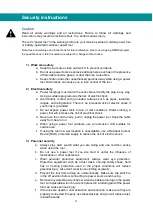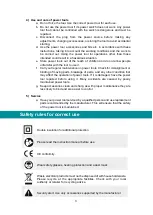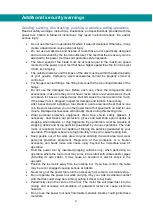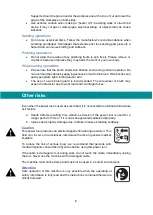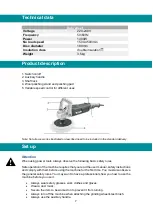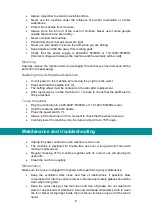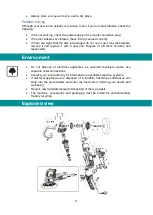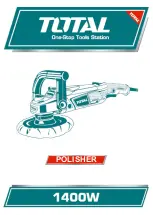
5
•
Do not use tools or cutting tools that require coolant. The use of water or other
liquid coolants may result in electrocution or electrical shock.
Rollbacks and Related Warnings
Kickback is a sudden reaction when a wheel, back cushion, brush, or other accessory
binds or snags. Binding or snagging causes a rapid lockup of the disc which, in turn,
causes the uncontrolled power tool to be forced in the opposite direction of tool rotation.
Kickback is the result of power tool misuse and/or incorrect procedures or conditions.
This can be avoided by taking the proper precautions.
•
Keep a firm grip on the power tool to allow it to resist kickback forces. Always use
the auxiliary handle, if provided, for maximum control over kickback or torque
reaction during start-up. Torque reactions or kickback forces can be controlled by
the operator if proper precautions are taken.
•
Never place your hand near the running tool, it could snap on your hand.
•
Do not position your body in the area where the power tool will move if kickback
occurs. Kickback will propel the tool in the opposite direction of wheel motion at
the point of contact.
•
Take special care when working around corners, sharp edges, etc. Prevent the
accessory from bouncing and snagging. Corners, sharp edges, or kickback have
a tendency to snag the rotating accessory and cause loss of control or kickback.
Abrasive grinding and cutting operations
•
Use only the types of discs that are recommended for your power tool and the
specific guard designed for the selected wheel. Wheels for which the power tool
was not designed cannot be adequately covered and are unsafe.
•
The cutting surface of depressed center abrasive wheels should be mounted
below the plane of the guard cutting edge. An incorrectly mounted wheel that
protrudes beyond the plane of the guard edge cannot be adequately protected.
•
The guard must be firmly attached to the power tool.
•
Discs should only be used for recommended applications.
•
Always use the correct accessories for the correct size and design of the discs.
Disc flanges must be different from grinding wheel flanges.
•
Do not use worn wheels from larger power tools. The blade intended for a larger
power tool is not suitable for the higher speed of a smaller tool.
Abrasive cutting operations
•
Do not "jam" the disc or apply excessive pressure. Overloading the disc increases
susceptibility to binding and the possibility of kickback or breakage.
•
Do not place the body near the cutting area of the disc. When the wheel locks up
at the point of contact and in the event you stomp, that kickback will direct the
tool toward your body.
•
When the blade jams for any reason, turn off the tool and hold it still until it comes
to a complete stop. Never try to remove the cutting disc by turning the tool on
again, otherwise kickback may occur. Investigate and take corrective action to
eliminate cause of stall.
•
Do not restart the cutting operation on the workpiece. Let the blade come up to
full speed and carefully recut. The wheel can bind, ride up, or kick back if the
power tool is restarted on the workpiece.
•
Use support panels or any large work piece to minimize the risk of tool pinching
and kickback. Large workpieces tend to give way under their own weight.
Summary of Contents for TP1141806
Page 1: ...1 v POLISHER...
Page 10: ...10 POLISHER...


